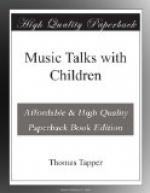Thus, when we are earnestly asked to do something worthy with the hands every day, we can understand why. I do not mean one worthy thing, but some one particular worthy act, especially thought out by us. To do that daily with forethought will purify the heart. It will teach us to devote the hands to that which is worthy. Then another old truth that every one knows will be clear to us: “As a man—or a child, for that matter—thinketh in his heart, so he is.”
Bit by bit the thoughts of this Talk will become clear to you. You will feel more friendly toward them. Then you will really begin to think about hands; your own hands and everybody’s hands. You will become truthful of hand, guiding your own thoughtfully; watching those of others carefully. And you will find that in the smallest tasks of your hands you can put forethought, while every use to which people put their hands will teach you something if you observe carefully. It may be folding a paper or picking up a pin, or anything else quite common; that matters not, common things, like any others, can be done rightly.
By this observation we shall see hands performing all sorts of odd tricks. The fingers are drumming, twitching, twirling, closing, opening, doing a multitude of motions which mean what? Nothing, do you say? Oh! no, indeed; not nothing but something. Fingers and hands which perform all these unnecessary motions are not being commanded by the thoughts, and are acting as a result of no thought; that is, of thoughtlessness. Every one does it do you say? No, that is not true. Many do these things, but those who command their thoughts never allow it. If we never moved the hands except in a task when we commanded them, we should soon become hand-skilled. The useless movements I have spoken of unskill the hand. They are undoing motions, and teach us that we must govern ourselves if we would become anything. Do you know how it is that people do great things? They command themselves. Having determined to do something, they work and work and work to finish it at any cost. That gives strength and character.
Having observed the hands and their duties, we can readily see the kind of task they must do in music. It is just the same kind of task as laying a wall of stone. Every motion must be done honorably. Everything must be thought out in the mind and heart before the hands are called upon to act. Wise people always go about their tasks this way. Unwise people try the other way, of acting first and thinking it out afterward, and, of course, they always fail. You can now understand that a great pianist is one who has great thought with which to command the hands. And to be sure they will obey his commands at once, he has made them obey him continuously for years. This teaching the hands to obey is called Practice.
The Italian artist, Giotto, once said:
“You may judge my masterhood of craft by seeing that I can draw a circle unerringly.”




